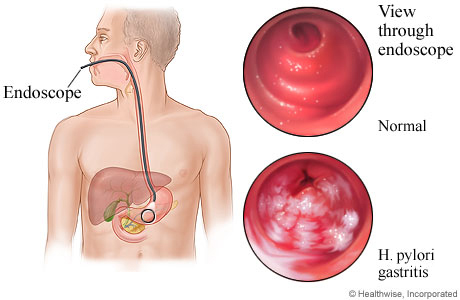What is Helicobacter pylori bacteria?
Helicobacter pylori is a type of bacteria that is a major cause of stomach (gastric) and upper small intestine (duodenal) ulcers. Infection with H. pylori may also increase the risk of stomach cancer.
What are the symptoms of an H. pylori bacterial infection?
Most people don't have any symptoms. But sometimes an H. pylori infection causes an upset stomach or a stomach sore (ulcer). Symptoms of an ulcer include gnawing or burning pain in the belly that can last for hours. Taking antacids or eating helps relieve the pain, but the symptoms may come back.
H. Pylori Gastritis as Seen During Endoscopy

Gastritis is inflammation or irritation of the stomach lining. It can be caused by some medicines (such as aspirin or other anti-inflammatory medicines), overuse of alcohol, stomach acid, or bacterial infection.
An infection with the bacteria Helicobacter pylori (H. pylori) can cause gastritis. H. pylori is also the bacteria that causes ulcers.
One way to test for H. pylori is to take a tissue sample from the stomach. The doctor uses a thin, flexible, lighted viewing instrument (endoscope) to look down your throat and into your stomach. Looking through the endoscope, your doctor may also see irritation or inflammation in the lining of your stomach. This irritation is gastritis. And a tissue sample will tell the doctor if the cause is H. pylori.
How are Helicobacter pylori bacteria treated?
You can get rid of Helicobacter pylori bacteria by taking certain antibiotics that are specifically directed at this bacteria.
People who had a peptic ulcer and are infected with H. pylori need treatment to cure the infection. This will lower their risk of getting another peptic ulcer. Treatment with a combination of medicines works very well to cure an H. pylori infection. Sometimes H. pylori bacteria are resistant to certain antibiotics. This can keep the medicine from killing the bacteria.
Some people who take medicine to treat the H. pylori infection may need a follow-up test to make sure that the infection is cured.
How can you care for your child who has H. pylori bacterial infection?
- If the doctor prescribed antibiotics for your child, give them as directed. Do not stop using them just because your child feels better. Your child needs to take the full course of antibiotics.
- If your doctor prescribes other medicine, have your child take it exactly as prescribed. Call your doctor if you think your child is having a problem with their medicine. You will get more details on the specific medicine your doctor prescribes.
- Serve smaller meals more often, instead of three larger meals a day.
- Avoid serving foods that bother your child. And avoid things that can irritate their stomach lining, such as black pepper or items with caffeine (soda, tea, and chocolate).
- Keep your child away from smoke. Do not smoke or let anyone else smoke around your child or in your house. Smoke slows the healing of your child's ulcer and can make an ulcer come back.
- Do not give your child ibuprofen, aspirin, or other anti-inflammatory medicines, because they can irritate the stomach. If your child needs pain medicine, try acetaminophen (Tylenol).
- Do not give your child two or more pain medicines at the same time unless the doctor told you to. Many pain medicines have acetaminophen, which is Tylenol. Too much acetaminophen (Tylenol) can be harmful.
H. pylori bacterial infection: When to call
Call 911 anytime you think you may need emergency care. For example, call if:
- You vomit blood or what looks like coffee grounds.
- Your stools are maroon or very bloody.
Call your doctor now or seek immediate medical care if:
- You have new or worse belly pain.
- You are vomiting.
- Your stools are black and look like tar, or they have streaks of blood.
Watch closely for changes in your health, and be sure to contact your doctor if:
- You do not get better as expected.
©2011-2026 Healthwise, Incorporated
